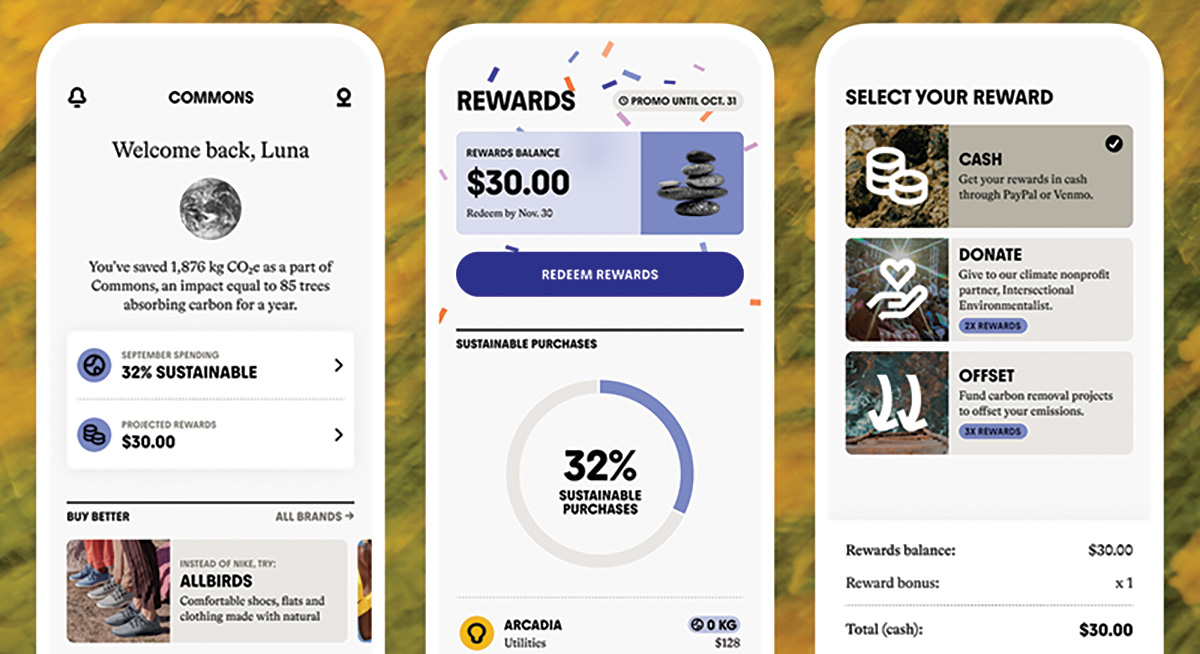Sanchali Pal ’12 Is Helping Consumers to Live More Sustainably
Pal’s app, Commons, advises users on how to make their everyday choices greener
When she was a senior at Princeton, Sanchali Pal ’12 started tracking her carbon footprint using a spreadsheet.
While climate change concerns had occupied her radar for a while, watching the documentary Food, Inc., about the environmentally damaging effects of industrial food systems, cemented Pal’s resolve to live sustainably. The spreadsheet experiment went on for six years. By eating less meat, buying secondhand clothes, and using less energy, Pal lowered her emissions and saved about $2,000 a year. “I was also happier and healthier and more aligned with my values,” she says.
But the spreadsheet method was too tedious and not scalable — significant obstacles to Pal’s ambitions of effecting a wider carbon revolution one consumer at a time.
Even if more than half of Americans surveyed by Pew Research Center in 2023 view climate change as a major threat, not many would use a spreadsheet to track their footprint, Pal realized. Instead, much like awareness about calories has influenced food spending, consumers need to develop “carbon intuition” so living sustainably becomes second nature, she says.
Pal launched Commons, an app that helps consumers do just that. “It makes it easy for people to make spending choices that are better for them and better for the planet,” says Pal, who is founder and CEO of the startup. The app launched as Juro in 2020 before rebranding to Commons in 2023.
Free to download, the app educates consumers about ways to live sustainably — covering everything from how to compost in an apartment to switching to a fossil-fuel-free 401k. When users link their spending data, they can track their real-time carbon footprint and see the emissions behind their purchases. They receive personalized tips based on spending — including relevant brands and guides. Users can also buy carbon offsets, a way of canceling unavoidable carbon emissions by supporting projects that decrease them. Commons earns 20% from offset fees. The average Commons offset subscriber pays about $35 a month. The startup reports that in 2022, Commons users, numbering in the tens of thousands and growing, reduced their footprint by an average of 20% and saved $200 a month.
Commons tracks consumer spending as a proxy for carbon accounting. Pal spent more than a year working with advisers from MIT and Yale School of the Environment to develop robust and accurate measures of the carbon footprints of routine consumer purchases. Finally, Pal developed a diverse portfolio of credible carbon offset projects, a set that is revisited every quarter.
Despite its promise, the startup struggled with funding early on. A cold call to a Princeton alum, Bryan Schreier ’00 of venture capital firm Sequoia, provided necessary momentum and part of a $1 million preseed funding round. “I found his email in TigerNet, the alumni database, and he replied right away,” Pal says of Schreier.
Commons has raised $13.9 million since its inception and added recognizable names, including civil rights activist Colin Kaepernick, to its board. Kaepernick’s ability to bring awareness to the Black Lives Matter movement showed how just one person can launch a movement, a dynamic that can translate laterally to climate action as well, Pal believes.
“Commons is about more than carbon footprinting,” Pal says. “It’s about sustainable living and making an impact.”
“It’s not just about me, it’s about the collective change that could happen if millions of us shift demand,” she adds.











No responses yet